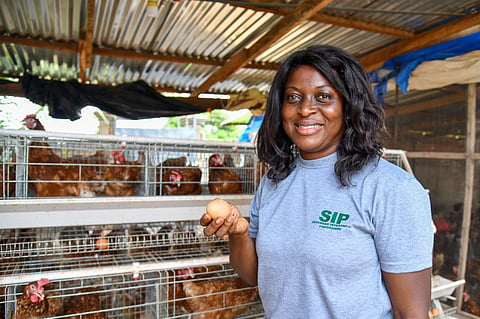
- Home
- EventsEvents
- Product Launches
- CategoriesCategories
- Advertise
- Opinion

The Board of Directors of the African Development Fund has approved a $27.9 million grant to Ghana for the development of agricultural value chains in the Savannah region. The grant will increase the climate-resilient production of maize, rice, and soybean, support the poultry value chain, and generate employment for women and youth. It will increase the incomes of farmers and support household nutrition, especially in more vulnerable women-headed households.
This would be achieved through the facilitation of private sector investment in sustainable value chains associated with commercial maize, soybean, and rice production, with an integrated poultry value chain, which will primarily involve women and youth. The Savannah Agriculture Value Chain Development Project will be implemented by Ghana’s Ministry of Food and Agriculture from 2023 to 2027. Overall, the project will benefit at least 150, 000 people indirectly and 50,000 directly. It will add to the production of at least 8,000 hectares of new rice, maize, and soybean, which will improve feed availability for the poultry industry.
This grant aligns with the Bank’s medium-term development framework for 2022-2025, which seeks to provide conditions for the private sector to boost growth and create abundant employment opportunities, especially for the youth by transforming agriculture and industry. It is also aligned with the Bank’s priority area focusing on the development of agroecological zones, especially the Savannah regions of Africa, and creating opportunities for the continent’s youth.
The Bank’s Acting Vice-President of its Regional Development, Integration, and Business Delivery Complex, Marie-Laure Akin-Olugbade, said building local capacity, would help reduce imports and help Ghana to mitigate the negative impact of Russia’s invasion of Ukraine on global food systems. It would also alleviate the impact of climate change, in line with the Bank’s African Emergency Food Production Facility, she noted.
“This builds on Bath bank's earlier investments in the savannah areas of Ghana, putting 20,000 hectares of maize and soybean under production using conservation agriculture practices and technologies. This project has come at a time when Ghana seeks to enhance domestic production and reduce imports. These are the key objectives of the bank's Feed Africa Strategy,” said Martin Fregene, the Bank’s Sector Director of Agriculture and Industry.
The grant will support farmers with farm inputs to produce climate-resilient rice, maize, and soybean. It will also support the production of certified seeds by commercial farmers and work closely with the Savannah Agriculture Research Institute, to support smallholder farmers with equipment to improve planting and crop husbandry. This support will include the enforcement of community by-laws and promote the use of hybrid seeds, good agriculture practices, sound water, climate resilience, adaptation, and integrated pest management.
The project will also enhance the capacity of Micro and Small-sized Enterprises (SMEs) and offer skills development for youth and women through sustainable entrepreneurship and mentoring programs, especially in the poultry value chain.
On the approval of the project, Eyerusalem Fasika, manager, Ghana Country- African Development Bank, said “The approval of this project is a significant addition to the Bank’s active agriculture portfolio in the country with immense potential to contribute to sustainable food systems in Ghana. Furthermore, the project’s approval is an opportune time for the Bank to support the Government in its efforts to produce enough basic commodities to meet food security challenges and support industrialization.”
Click HERE to subscribe to our FREE Weekly Newsletter
